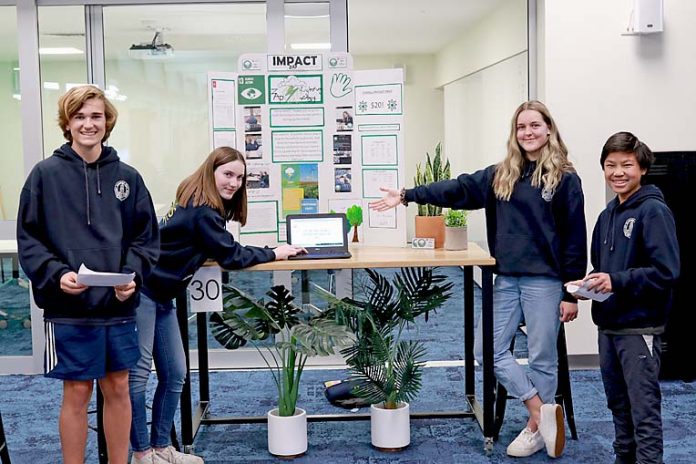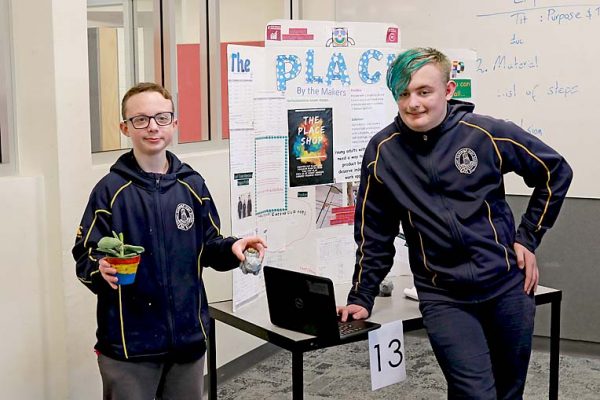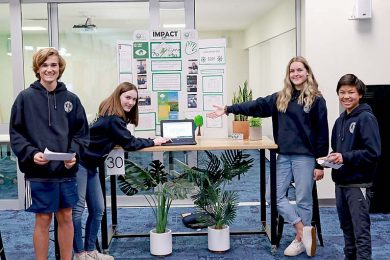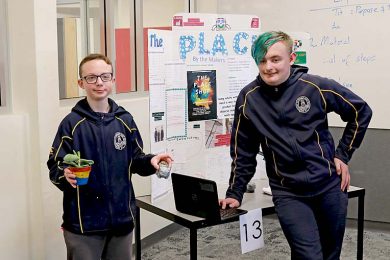

RECYCLING ocean debris into fashionable jewellery and creating efficient wind-powered cars were among several innovative business ideas pitched by Mount Gambier High School students during a new entrepreneurial program.
Over the last four weeks of Term 2, the Brownes Road site integrated The Foundation for Young Australians’ $20 Boss into its Year 8 English, Math and Humanities and Social Sciences (HASS) core curricular subjects.
While working in small groups, 120 students were given $20 to kick-start a small business they thought would benefit the local community.
With the help of 16 staff members, each group started the project by researching the United Nations 17 Sustainable Development Goals to help decide the basis of their project.
Last week, students pitched their business ideas during the site’s Ideas Expo to finalise the program.
ScRoll Queen founder Dylan McQueen, Bricks and Mortar co-founder Peter Loring and children’s book creator and ALIVE coaching founder Ali Villani each provided insightful presentations to students surrounding their business development and what happens behind-the-scenes as an entrepreneur.
Entrepreneurial Specialist School assistant principal Josh Praolini said $20 Boss was spearheaded by entrepreneurial education teacher Jess Magarey and HASS coordinator Kathryn Sutton.
He said the whole program tied in well with the school’s entrepreneurial focus, helping students to develop essential skills not necessarily incorporated into everyday classroom learning.
“These are skills such as collaboration, problem finding and solving, critical thinking and resilience which kids may need will to be competitive in the job market,” Mr Praolini said.
“Students used their entrepreneurial skills and developmental goals to look for a problem and found a way they could be part of the solution at a local level.
“We talked about how entrepreneurs look at ways they can add value to the world around them and it was not just about making money, but how they can contribute.”
Mr Praolini said he was blown away by the students’ concepts, but would not expect any less.
“Every time we work with these kids I just know something cool is coming,” he said.
“The complexity of their thinking and the connections they make blow me away.”
The program also involved the school’s special options class.
Mr Praolini said the program was open and easily adaptable, making it an optimal equaliser for all students.
“When we measure kids by the way they read, write and count, we are not measuring their ability to have complex thinking and thoughts,” he said.
“This program allowed all ideas to shine.”
While pitching his idea Happy Light to The Border Watch last week, Year 8 student Seth Loveridge explained his business would benefit children undergoing long-term hospital treatment.
His concept involved a transportable light which could project shapes onto hospital roofs and walls for entertainment.
“I would like to sell them a box of imaginations and the spare profits would be donated to hospitals to help purchase toys and extra entertainment,” Seth said.
“I just feel like lots of people are sad and I just wanted to give them something to focus on.
“I found this program helped my math including how much it would cost to make and what I would have to do to make them at an affordable price at a quick time, but also with a profit.”
Seth said he was grateful to be involved in the program which helped him better understand the requirements and logistics of operating a successful business.
“It has made me seriously consider possibly running a business in the future,” he said.
Year 8 student Zoe Phelan said her group used organisation, creativity, numeracy and information technology skills to help develop the business idea ZAP.
ZAP involved a website which people could use to browse through to select the most energy-efficient and energy-friendly appliances for customers rather than the cheapest.
Zoey said there was a lot of components behind running a business she did not fully understand until she was involved in the program.
“You see the end product and it looks easy from the outside, but when you are involved in stuff like this, you get to see what it really takes and all the other things underneath,” she said.
“I think it forced us to think about an idea, but once we have that idea it just flowed on.
“It has been great to actually talk to people in the community which we may not particularly know and share all the hard work we have been putting in over the past couple of weeks.”
HASS coordinator Ms Sutton said the program was beneficial for student development and looked forward to implementing it further into the curriculum.
“It allowed students to focus on something they were interested in and engage in some very powerful learning,” Ms Sutton said.
“Things like having those deep rich conversation at the end of a lesson showed the impact the program had.
“Some of the ideas had not ever crossed my mind before and it was very impressive for these 13 and 14 years olds to come up with something completely unique.”









